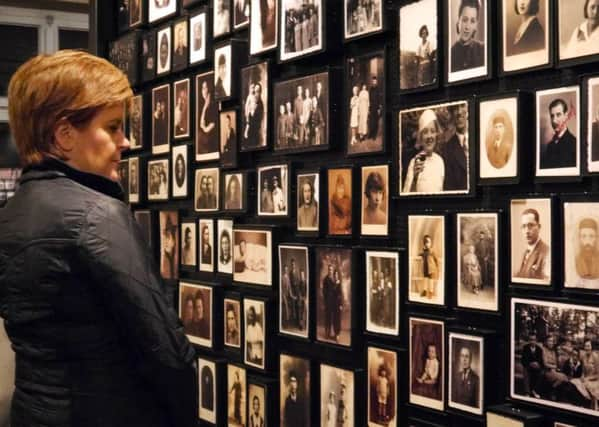Nicola Sturgeon: Rising antisemitism risks a return to Auschwitz


This week I had the honour to accompany school pupils and teachers from across Scotland to the Auschwitz-Birkenau Museum and Memorial. This was part of the Lessons from Auschwitz project run by the Holocaust Educational Trust, which is based on the premise that “hearing is not like seeing”.
Having now visited Auschwitz-Birkenau, I understand how true that is. Like everybody else, I had previously seen plenty of photos and footage of the camps – and I thought I would be prepared for the emotional impact the experience would have on me. But the effect was significantly beyond anything I could have imagined.
Advertisement
Hide AdAdvertisement
Hide AdWhat struck me the most was the sheer scale of what we saw – especially at Birkenau, where mass murder took place on a scarcely imaginable level. Each and every person who suffered or died there was an individual human tragedy. As we walked round the sites, we saw glimpses into the lives of hundreds of thousands of victims. We saw their personal belongings they had taken with them – luggage, shoes and everyday household items – not knowing the fate awaiting them at the end of their long journeys. We saw their house keys, never to be used again after they arrived at the camps.
One of the most harrowing parts of the visit for me was looking at the pictures of the babies and children who were murdered there – something which I am still struggling to process.
It is important we remember these individual victims – we all have a duty to ensure their memory never fades. This is becoming even more important with every year which passes, as fewer and fewer people who have direct memory of what happened are still alive. It is down to us, and generations to come, to make sure we keep their legacy alive – and visiting the camps helps us do that.
This is something that the Holocaust Educational Trust emphasises to the young people taking part in the programme. Visiting the camps is not easy, but in doing so we honour the memory of the individuals whose lives were lost. We also celebrate the lives of those who survived and went on to have families all over the world, including here in Scotland.
It is important that as many people as possible visit Auschwitz-Birkenau to see and experience the sites in their historical context. However, we shouldn’t just think of the experience as a history lesson.
Sadly, we live in a world today where antisemitism has reared its head again and in which racism, prejudice, intolerance and hatred of all kinds are all too present. This has most recently been seen in the tragic events at a Pittsburgh synagogue last week.
While the Holocaust was perpetrated by the Nazi regime, it was facilitated by thousands of ordinary people who went along with what was happening and perhaps turned a blind eye. Of course, the Holocaust didn’t start in Auschwitz – it started in the everyday antisemitism and discrimination which was allowed to flourish at the time. What happened under the Nazis, and in the recent events in Pittsburgh, are at the end of a spectrum which begins with allowing racism, prejudice and hatred to spread in society.
One of the most important lessons I took from the visit is that we should not be a bystander in our everyday lives – and not turn a blind eye – to prejudice, discrimination, bigotry and racism. It is incumbent on all of us to think about what we can do to confront and challenge hatred and division wherever we find it.
Advertisement
Hide AdAdvertisement
Hide AdAnd, while it is the responsibility of all of us to ensure we promote an inclusive society, it falls to the young generation in particular to make sure we don’t allow our world to slip backwards into the horrors that happened at Auschwitz-Birkenau. They will be the generation which must keep the world moving forward on the basis of tolerance, peace and understanding.
That is why programmes like the Lessons from Auschwitz are so important – they show in horrifying detail what can happen when hatred and intolerance go unchecked.
Our day in Poland ended with an emotional ceremony to remember the victims of the Holocaust. We were joined by Rabbi Daniel Epstein, who told the story of his grandmother who escaped Nazi Germany to the safety of a job in Scotland. It was with the help of two strangers that she was able to escape from persecution in her home country – a valuable lesson to us all that a simple act of kindness can have a profound effect on someone else’s life.
This was a visit I have wanted to make for a long time, and it meant a great deal to me that I could be there with young people as part of the Lessons from Auschwitz project. I got to know them on the journey over, and when I said goodbye to them at the end of a long day it was very evident just how moved they were by what they had learned.
I would urge everyone to visit Auschwitz-Birkenau if they get the opportunity – and to use the experience to persuade others to challenge hate and discrimination. By doing so, we can all play a part in making our world a better place.